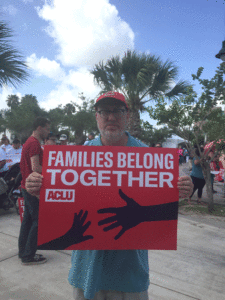by MAX SPARBER
Community News Editor
Frank Hornstein, DFL-Mpls, had a strong reaction to the news that children of asylum seekers were being separated from their parents. “I was very shocked and appalled when it was announced,” he said in an interview with American Jewish World.

Hornstein quickly made plans to travel to Texas. “I felt a need to bear witness and see for myself what was going on,” he explained.
A former community organizer, Hornstein began to look for grassroots activism around the issue. He soon found a planned event, named the “#FamiliesBelongTogether Rally,” that was scheduled to take place June 30 in a park across the street from the Brownsville Federal Courthouse in Texas. There, adult immigrants have faced mass prosecution, part of a national policy that has resulted in at least 2,000 children being separated from their parents.
The children have been moved into a variety of facilities with little or no oversight and no mechanism for reunification, which has been the source of considerable criticism. One migrant 14-month-old child was separated for 85 days and, when returned, was found to be infested with body lice; this is just one incident cited in a lawsuit motion filed this month by 17 states and the District of Columbia against President Donald Trump and federal agencies. The lawsuit seeks to demand that the children be reunified with their parents.
At the Brownsville rally, Hornstein found an estimated 1,500 to 2,00 protestors. “I had an opportunity to meet a lot of the people there, get a sense of what was going on,” he said. Noting that “it was a short visit,” Hornstein is now making plans to put together a delegation to return. “They have a lot of needs,” he said. “We need people with a legal background, people who are bilingual.”
“I left feeling hopeful about the people who are down there on the front lines,” Hornstein said. “They were really energizing and inspiring to me.” He noted that many of the protestors have faced harassment and intimidation from federal agents. “They’re really doing heroic work,” he added.
According to Hornstein, there is also a Jewish angle to these protests. “A lot of Jewish groups have specifically taken on the mantle of this issue,” he said. “In many ways it relates to our own history, our own problems getting into this country. Jews are a people who have dealt with refugee and immigrant status.”
As a result, Jewish leaders have started circulating the idea of linking this issue to Tisha B’Av, a holiday that commemorates the destruction of the first and second Temple in Jerusalem and the Jewish experience of exile, which this year falls on July 21 and 22.
Hornstein met with an organization in Texas called LUPE (La Unión Del Pueblo Entero, that can be found online at lupenet.org), an organization founded by César Chávez, the labor leader and civil rights activist who was famous for incorporating fasting into his protests.
The organization has responded to the Trump administration policy with a project called Break Bread Not Families (found online at breakbreadnotfamilies.org), asking people to fast in solidarity and donate the money that would have been spent on food to LUPE, Neta (an organization dedicated to inspiring young people to act on social and cultural issues) and the Texas Civil Rights Project.
As Tisha B’Av is already a fasting holiday, Jewish leaders suggested coupling the holiday with Break Bread Not Families. “Hopefully this will catch on,” Hornstein said.
“I hope the Jewish community will continue to put resources into this fight,” Hornstein added.
“This is an extreme manifestation of a very broken system.”
For locals who are interested in participating or helping in some other way, Horstein recommended contacting him at his office (he can be found online at frankhornstein.org).
Hornstein is not the only local Jewish leader to travel to investigate this issue. In early July, Rabbi Arielle Rosenberg of Congregation Shir Tikvah traveled to San Diego with a delegation of rabbis protesting Trump’s immigration policies. They participated in a daylong protest with the Latino group Mijente, and then crossed the border to Tijuana to meet with asylum seekers and some of the organizations helping to assist asylum seekers.
Rosenberg’s writing about her experience can be found in the July 13 print edition of the American Jewish World.
(American Jewish World, 7.13.18)




















